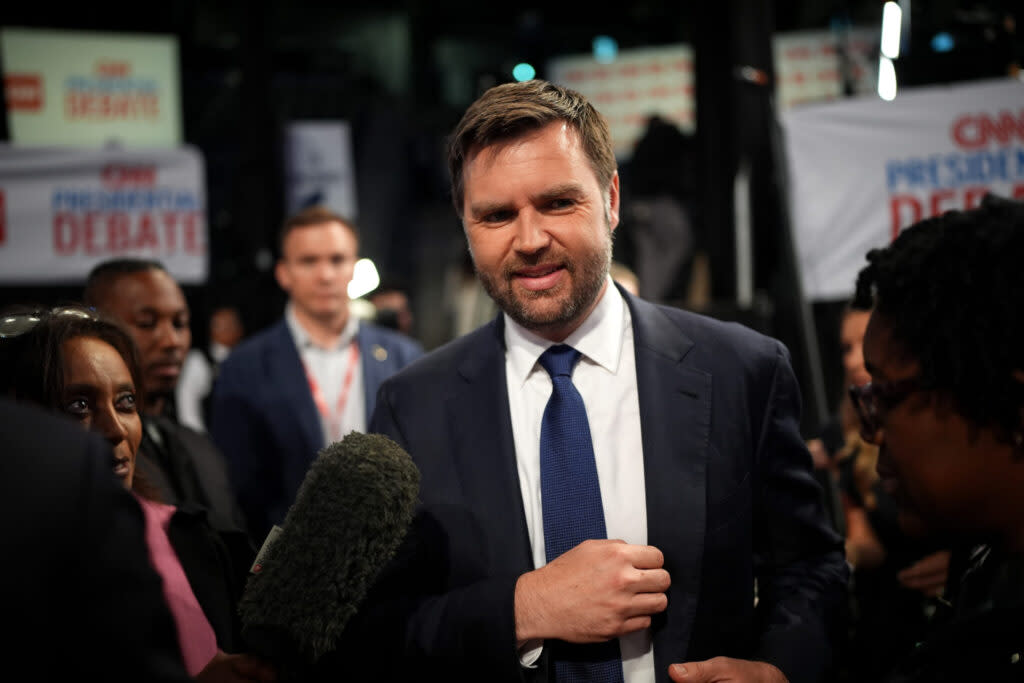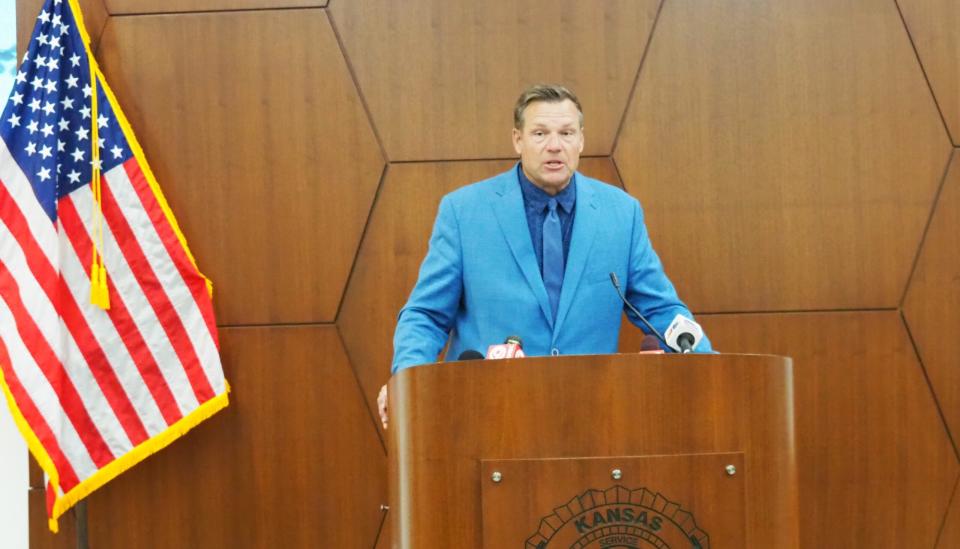‘Weird’ Republicans: Trump, Vance and Kobach can be summed up in one word

- Oops!Something went wrong.Please try again later.
- Oops!Something went wrong.Please try again later.
- Oops!Something went wrong.Please try again later.
- Oops!Something went wrong.Please try again later.
Republican presidential candidate and former President Donald Trump mocks U.S. President Joe Biden while speaking during a Get Out The Vote rally at Coastal Carolina University on Feb. 10, 2024, in Conway, South Carolina. (Win McNamee/Getty Images)
The word of the moment is “weird.”
That’s the term floating around about former president and presumptive Republican presidential nominee Donald Trump and his running mate, Sen. J.D. Vance. Pioneered as an attack line by Minnesota Gov. Tim Walz, “weird” encapsulates the peculiar position of our modern-day Republican Party. It wants voters to support a singularly unappetizing duo, one of them prone to monologues about Hannibal Lecter and sharks, the other hating on “childless cat ladies.”
I’m telling you: these guys are weird. pic.twitter.com/fvNRNf7T7T
— Tim Walz (@Tim_Walz) July 24, 2024
This attack wouldn’t have gone anywhere if leveled by Democratic President Joe Biden. At 81 years of age and deep into the uncanny valley of repeated facelifts, the president can disconcert audiences. But with Vice President Kamala Harris replacing Biden at the top of the ticket, Walz’s attack packs a punch.
Yes, Trump and Vance may pose an authoritarian threat to our democracy. I’ve made the point, as have Biden and a host of others. But that puts a heavy burden on voters, one they may be reluctant to accept while grappling with high food prices and expensive housing.
Far simpler to see the orange-hued Florida man as, well, weird.
“It perfectly describes the uneasiness people feel. It’s how people who don’t live and breathe politics every day react to hearing the Republican vice presidential candidate denigrate people without children,” Democratic strategist Tim Hogan told Politico. “It’s simple. It’s how you might talk to your neighbor about the crazy political climate we’re living in.”
“Weird” summarizes Republican extremism across the board.
Obsessed with transgender people’s private lives? Weird.
Angry about women and people of color participating in society? Weird.
Claiming fetuses are people and putting reproductive health care at risk? Yeah, that’s weird too.
Here in Kansas, the word could be used fruitfully about Attorney General Kris Kobach. His dogged pursuit of pet issues such as disenfranchising voters, in the face of facts, logic and continuing legal education, seems pretty darn odd when you come down to it. House Speaker Dan Hawkins’ crusade to block health insurance from those in need — while simultaneously running an insurance business of his own — well, it’s certainly weird.
Don’t even get me started on the Kansas Legislature.
By the way, I don’t mean to cast aspersions on any good-natured weirdos and oddballs. As a longtime journalist, I come from a quirky clan. No, we’re talking about people who choose their weirdness as a way of harming others. These people have adopted a set of beliefs and advocate a slate of proposals that don’t benefit our country or state, but instead serve their own selfish ends.
The word also signifies a generational shift in national electoral politics. One that’s long overdue. As Reflector columnist Eric Thomas pointed out earlier this month, baby boomers have held the highest office for decades in the United States, and their concerns and rhetoric have grown rancid with repetition.
“Modern messaging didn’t jibe with Biden. Not his fault, but he is 81 and it just couldn’t connect,” said Washburn University political science professor Bob Beatty. “Harris may be my age, but that’s good enough because she’s got a direct connection to this generation that’s once removed, not twice or three times removed like Biden and Trump.”
He added: “I’ve been hearing the term ‘weird’ from my students and kids for years and it’s a very effective term by the Dems to convey in their messaging that the behavior and stances of their opponents are way out of norm.”
Most people don’t understand that far from being immovable monoliths, U.S. political parties shift all the time.
Archconservative Republicans of today have little to do with the Republican Party as it emerged in the 1850s, as a progressive response to slavery. The Democratic Party once included a bloc of racist Southerners; a multiethnic coalition has thankfully replaced them.
We’re on the precipice of further change. As new leaders emerge, the future gleams with possibility. Republicans have grown more populist, although precisely what that means can be debated. Democrats have simultaneously become both more progressive and welcoming of “Never Trump” Republicans, making common cause for the future of our republic.
Exactly where this all ends up is anyone’s guess. However, calling extreme and hateful ideas what they are — “weird” — pushes both parties toward a sensible debate on actual issues that real people care about.
You might even call it normal.
A few images of Trump world being totally normal and not at all weird.
First, a collection of people who totally aren’t Batman villains:
1/ pic.twitter.com/QpSrAr6R6s— Veterans For Responsible Leadership (@VetsForRL) July 29, 2024
Clay Wirestone is Kansas Reflector opinion editor. Through its opinion section, Kansas Reflector works to amplify the voices of people who are affected by public policies or excluded from public debate. Find information, including how to submit your own commentary, here.


